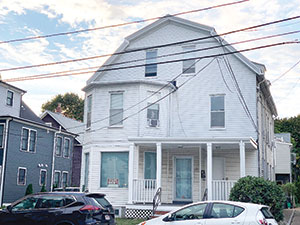
By Joseph Pauletto
Since early September, Ellen Shachter’s schedule has been packed to the brim. Between managing her team in the Somerville Office of Housing Stability (OHS) and working on policies and programs to help tenants and landlords, every day brings new challenges.
The catalyst for the recent uptick in workload for the OHS is Somerville’s extension of the residential eviction moratorium to April of next year, which gives residents time to secure a place to live if they cannot pay their rent. As a result, Shachter and her team have been working diligently trying to ensure that each and every tenant is successful in this process.
The housing crisis in Somerville has been a problem long before the pandemic began. According to a 2015 study by Massachusetts-based LDS Consulting Group, 73.8% of households with less than $95,360 of yearly income cannot afford Somerville rental housing without difficulty. These housing issues also tend to fall upon those in marginalized groups, as African-Americans, adults with disabilities, and single-parent families take on these hardships at a higher rate.
Since COVID-19, these problems have been exacerbated. When the Somerville Board of Health announced the moratorium extension, they cited “severe physical and mental health consequences, school disruption, and job loss” as some of the damaging results of housing instability.
In light of these significant problems with housing in Somerville, Shachter has not changed the way she works, approaching her job in a very task-oriented manner. “I really like doing things that feel concrete,” Shachter said. “Like helping somebody get a Section 8 voucher. One day they didn’t have it, one day they did.”
Shachter’s professional experience is an essential tool that helps her effectively execute her responsibilities. After studying law at Northeastern University, she worked as a legal service lawyer for almost 30 years. That helped her gain important knowledge of the legal system and a knack for helping people who lack access to critical resources.
Shachter’s passion for her job stems from her time working at Pathway’s Family Shelter, the first state-funded shelter for families in Massachusetts. Fresh out of college, she had the opportunity to work closely with people in poverty, which made her realize just how significant affordable housing is to combat homelessness.
With so many responsibilities, Shachter cites her impassioned and diverse team as one of reasons she gets her job done. Lydia Lopez, a key member of Shachter’s team, is one of the staff members who helps Schachter in day-to-day operations, specifically when it comes to dealing directly with Somerville residents and the city’s immigrant community.
Lopez, an immigrant from El Salvador, gained her drive to help people find secure housing through her own life experience. “I came to the country, in the spectrum of immigration journeys, pretty well protected,” Lopez said. “Largely, that informed my identity and the way I wanted to help and uplift my community.”
Lopez also has a very personal connection to Somerville and its housing issues. After moving to the U.S. from El Salvador 20 years ago, Somerville was her first home. But Lopez and her family had to move to another city because they could no longer afford their rent.
“This wave of gentrification, just to use that word loosely, has been going on for a very long time,” Lopez said. “The people that we see here now in regards to marginalized, vulnerable communities…these are people that are really fighting to stay in the community they want to [stay in] even though everything points in the opposite direction.”
In addition to staff members like Lopez, Shachter collaborates with other agencies to delegate work with Somerville residents and help them deal with many housing-related issues. The Community Action Agency of Somerville (CAAS) is one of the agencies that OHS collaborates with the most. CAAS helps people in the process of finding or stabilizing their housing. The agency’s services include assistance with housing searches and applications for emergency shelter.
Ashley Tienken, the Director of Housing Advocacy at CAAS, has worked closely with Shachter and OHS. From her experience she views Shachter as a role model for anyone working in housing stability in Somerville.
“She is brilliant,” Tienken said. “I admire her tremendously for her wealth of knowledge when it comes to homelessness. She is an incredible resource to me and my team.”
While Shachter and her colleagues continue to work every day to make Somerville a more affordable place to live, progress still needs to be made before the housing crisis is alleviated. In the midst of all this difficult work, Shachter remains hopeful for the future.
“It is emotionally draining and certainly a difficult time for the tenants in Somerville and around the world,” Shachter said. “But at the same time, I feel hopeful about all the possibilities for solutions, and in some ways there is now more momentum for big, strong, bold change.”















Reader Comments